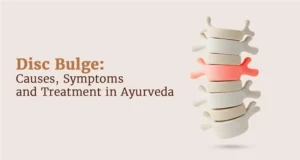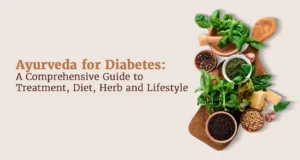Polycystic Ovarian Disease (PCOD) is one of the most common hormonal disorders affecting women today, leading to irregular periods, infertility concerns, weight gain, and other health challenges. It is a hormonal disorder where the ovaries produce multiple immature or partially mature eggs, which, over time, form fluid-filled cysts, disrupting the menstrual cycle and reproductive health.
In India alone, PCOD affects 9% to 36% of women, and the numbers continue to rise due to lifestyle, environmental, and genetic factors.
While modern medicine primarily focuses on symptom management through hormonal pills and lifestyle advice, Ayurveda takes a deeper, holistic approach addressing the root cause, restoring balance, and rejuvenating the entire reproductive system.
In this blog, we explore PCOD from an Ayurvedic perspective, its causes, symptoms, and the multi-stage treatment approach unique to this ancient science.
What is PCOD in Ayurveda?
In Ayurveda, PCOD is understood as a disorder rooted in dosha imbalance primarily Kapha and Vata, with Pitta often aggravated secondarily.
- Kapha imbalance leads to obstruction of the channels (srotas), causing cyst formation and weight gain.
- Vata imbalance disrupts the movement of the reproductive hormones, resulting in irregular cycles and ovulation issues.
- Pitta aggravation contributes to hormonal disturbances, inflammation, and acne.
Ayurveda views PCOD not just as a local ovarian issue but as a systemic imbalance involving digestion (Agni), metabolism, and mind-body harmony.
Causes of PCOD
The root causes often lie in diet (Aahara), lifestyle(Vihara), and mental health (Manas) factors:
- Irregular eating habits & heavy, Kapha-aggravating diet – excess intake of dairy, oily, processed, and sugary foods.
- Sedentary lifestyle – lack of physical activity increases Kapha dominance.
- Chronic stress & emotional disturbances – impacting Vata and Pitta balance.
- Suppressed natural urges & improper sleep patterns – disturbing hormonal rhythms.
- Poor digestive fire (Agni) & Ama (toxins) – leading to blockages in reproductive channels (Artava vaha srotas).
Symptoms of PCOD
Women with PCOD may present with:
- Scanty or irregular menstruation (Artava Kshaya)
- Excessive bleeding at times (Atyaarta)
- Reproductive disorders such as infertility (Yoniroga)
- Weight gain, especially around abdomen (Sthoulya)
- Hair fall (Keshapaatra) and acne(Mukhadooshika) due to aggravated Pitta
- Sluggish digestion, bloating, low metabolism (Manda Agni)
Ayurvedic Treatment Stages for PCOD
Ayurveda emphasizes a gradual, root-cause-oriented approach to PCOD treatment. Rather than merely suppressing symptoms, it focuses on detoxification, regulation, rejuvenation, and long-term balance.
Stage 1: Detoxification (Shodhana)
The first step is cleansing the body of accumulated toxins (Ama) and clearing blockages in the reproductive channels. Panchakarma therapies such as Virechana (therapeutic purgation) and Basti (medicated enemas) are commonly advised to balance Vata and Kapha.
This stage helps to restore proper circulation, improve digestion (Agni), and prepare the body for deeper healing. By eliminating impurities, the foundation for hormonal balance is laid.
Stage 2: Regulation (Shamana)
Once the body is cleansed, the focus shifts to restoring menstrual regularity and hormonal balance.
Herbal formulations like Ashokarishta, Shatavari, Triphala, and Guduchi are used to nourish the reproductive system, regulate ovulation, and stabilize hormonal fluctuations.
This stage works on addressing the root dysfunction of the ovaries, ensuring that the menstrual cycle becomes more predictable and healthy.
Stage 3: Rejuvenation (Rasayana)
After the system has been detoxified and balanced, Ayurveda moves towards rebuilding and nourishing the reproductive tissues (Artava dhatu).
Rasayana herbs such as Ashwagandha, Amalaki, and Gokshura are administered to improve vitality, fertility, and long-term reproductive health.
A wholesome, light, and easily digestible diet supports this stage, enhancing the body’s resilience against future imbalances.
Stage 4: Lifestyle & Mind-Body Alignment
The final stage ensures that the results of treatment are maintained for the long term. Diet and lifestyle modifications form the backbone of this phase.
A Kapha-Pitta pacifying diet, regular exercise, and yoga practices such as Baddha Konasana, Bhujangasana, and Malasana improve pelvic circulation and hormonal rhythm.
Stress management techniques like meditation and Pranayama are essential to keep the mind calm and the endocrine system stable. This holistic alignment prevents recurrence and supports overall well-being.
Conclusion
PCOD is not merely a reproductive disorder but a signal from your body that balance has been lost. Ayurveda’s holistic approach detoxifying, regulating, rejuvenating, and aligning lifestyle offers a sustainable, side-effect-free way to heal from within.





